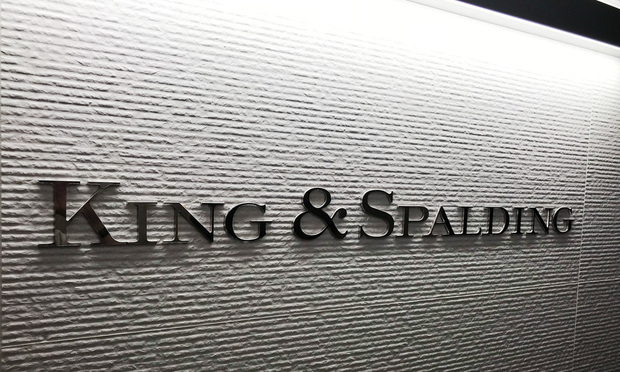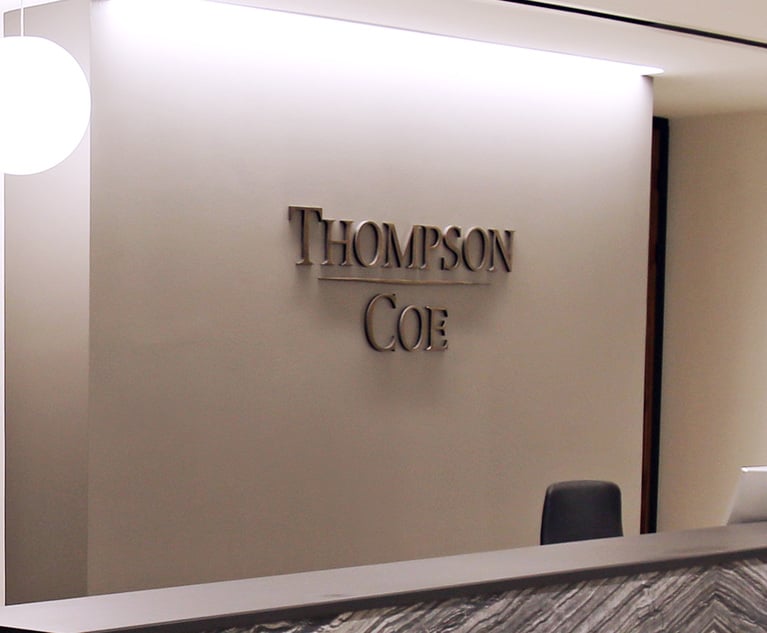King & Spalding, Georgia's Top Litigation Department, on Equifax, AFAs and More
The firm was named The American Lawyer's Georgia Litigation Department of the Year.
January 06, 2020 at 03:19 PM
5 minute read

Last month, at The American Lawyer Industry Awards in New York, The American Lawyer honored the litigation departments of six law firms for their work in jurisdictions across the country: Connecticut, Georgia, Florida, New Jersey, Pennsylvania and Texas.
King & Spalding, the Georgia winner, guided Equifax through one of the largest consumer data breaches in history, handled the tobacco litigation still pending in Florida for R.J. Reynolds, and secured a summary judgment win in a $200 million fraud case for Highstar Capital Fund.
The following Q&A contains responses from the firm's litigation department:
How would you describe the philosophy of your litigation department in terms of the types of matters you look to handle, the types of clients you look to represent and the way in which you approach cases?
For King & Spalding's 130-plus-year history, our trial and global disputes practice has been a core strength of the law firm, not only in Georgia, but globally. What sets our practice apart from that of our peers is that we actually try and arbitrate high-stakes cases every year around the globe in the most challenging jurisdictions for corporate clients. We approach our cases with creativity, meticulous preparation, and top-rate advocacy, helping our clients navigate the litigation lifecycle, working together from day one to identify business objectives, develop a strategy to meet those objectives and then execute that strategy. Our 450-plus disputes lawyers frequently collaborate with our transactional and regulatory lawyers—one area of expertise informing another—to provide clients seamless and efficient representation in the most complex and sensitive matters.
What cases this submission period best represent that philosophy and what did the firm's litigators do to get the client a successful result in those matters?
Our representation of Equifax in myriad cases arising from the high-profile cyber security incident announced by the company in September 2017 is a prime example of our team's approach. With Equifax enduring extreme public scrutiny, and with governmental investigations and regulatory probes occurring on a parallel track with civil litigation, our team fought tirelessly to achieve finality for Equifax in the highly sensitive multidistrict litigation venued in the U.S. District Court for the Northern District of Georgia. Successes include:
In January 2019, the court entered orders dismissing in their entirety the class actions filed by numerous small business owners, granting Equifax's motion to dismiss the highest exposure claims asserted by the certain financial institution plaintiffs, and granting in part and denying in part Equifax's motions to dismiss the consolidated consumer complaint, including dismissal of high exposure claims asserted under the Fair Credit Reporting Act.
On July 22, 2019, Equifax agreed to a settlement of approximately $1.4 billion to settle the over 400 consumer claims in the multidistrict litigation. The settlement includes Equifax's commitment to spend $1 billion on cybersecurity measures over the next five years and to establish a $380.5 million consumer restitution fund to pay for four years of credit monitoring and financial assistance for affected consumers.
How has the legal landscape in your jurisdiction evolved and how has the firm looked to adapt?
One of the most significant changes to the legal landscape both in Georgia and beyond is the prevalence of alternative fee arrangements to provide clients certainty and to drive efficiencies on the type of complex, cross-specialty, litigation matters our firm handles. We have been at the forefront of this development, having used AFAs in connection with automotive litigation matters since the 1970s. Today, a significant percentage of our work across litigation specialty areas is performed on AFAs, and we welcome the opportunity to work with clients under such arrangements, rather than traditional hourly billing.
What are you doing to attract, train and retain new talent in the litigation department?
At the base level, attracting, training and retaining talent at King & Spalding boils down to one thing: The high-quality work we do. People want to join the firm when they see high level of sophistication at which our team operates on the most important cases our clients face. Up and coming litigators receive the best training by working on these important matters. And lawyers want to stay with a firm that's working at the pinnacle of the litigation practice.
Apart from our high-quality work, we attract and retain talent because of our shared origination credit system that rewards teamwork and ultimately leads to better results for clients. And, of course we train our lawyers through a wealth of formalized training programs offered by the firm, including the Advocacy Academy offered every year in our Atlanta office and our new Trial and Global Disputes University program.
How does pro bono work factor into the litigation department's mission?
We approach our pro bono docket in the same manner as for our billable work. We seek opportunities to work for clients facing thorny legal issues, and we bring the same "trial lawyers" mindset to achieving successful outcomes. In that sense, our pro bono work is part and parcel of our mission. Pro bono opportunities also afford us with the ability to sharpen our skills by arguing challenging cases in novel areas of the law that have the ability to effectuate real change—often in the highest courts of our state and even nationwide. Additionally, pro bono cases often provide opportunities for junior lawyers to engage in stand-up courtroom activities at earlier phases of their careers, fostering the firm's commitment to mastery and sophistication among our litigation team.
This content has been archived. It is available through our partners, LexisNexis® and Bloomberg Law.
To view this content, please continue to their sites.
Not a Lexis Subscriber?
Subscribe Now
Not a Bloomberg Law Subscriber?
Subscribe Now
NOT FOR REPRINT
© 2025 ALM Global, LLC, All Rights Reserved. Request academic re-use from www.copyright.com. All other uses, submit a request to [email protected]. For more information visit Asset & Logo Licensing.
You Might Like
View All
KPMG Wants to Provide Legal Services in the US. Now All Eyes Are on Their Big Four Peers



K&L Gates Sheds Space, but Will Stay in Flagship Pittsburgh Office After Lease Renewal
Law Firms Mentioned
Trending Stories
- 1'It's Not Going to Be Pretty': PayPal, Capital One Face Novel Class Actions Over 'Poaching' Commissions Owed Influencers
- 211th Circuit Rejects Trump's Emergency Request as DOJ Prepares to Release Special Counsel's Final Report
- 3Supreme Court Takes Up Challenge to ACA Task Force
- 4'Tragedy of Unspeakable Proportions:' Could Edison, DWP, Face Lawsuits Over LA Wildfires?
- 5Meta Pulls Plug on DEI Programs
Who Got The Work
Michael G. Bongiorno, Andrew Scott Dulberg and Elizabeth E. Driscoll from Wilmer Cutler Pickering Hale and Dorr have stepped in to represent Symbotic Inc., an A.I.-enabled technology platform that focuses on increasing supply chain efficiency, and other defendants in a pending shareholder derivative lawsuit. The case, filed Oct. 2 in Massachusetts District Court by the Brown Law Firm on behalf of Stephen Austen, accuses certain officers and directors of misleading investors in regard to Symbotic's potential for margin growth by failing to disclose that the company was not equipped to timely deploy its systems or manage expenses through project delays. The case, assigned to U.S. District Judge Nathaniel M. Gorton, is 1:24-cv-12522, Austen v. Cohen et al.
Who Got The Work
Edmund Polubinski and Marie Killmond of Davis Polk & Wardwell have entered appearances for data platform software development company MongoDB and other defendants in a pending shareholder derivative lawsuit. The action, filed Oct. 7 in New York Southern District Court by the Brown Law Firm, accuses the company's directors and/or officers of falsely expressing confidence in the company’s restructuring of its sales incentive plan and downplaying the severity of decreases in its upfront commitments. The case is 1:24-cv-07594, Roy v. Ittycheria et al.
Who Got The Work
Amy O. Bruchs and Kurt F. Ellison of Michael Best & Friedrich have entered appearances for Epic Systems Corp. in a pending employment discrimination lawsuit. The suit was filed Sept. 7 in Wisconsin Western District Court by Levine Eisberner LLC and Siri & Glimstad on behalf of a project manager who claims that he was wrongfully terminated after applying for a religious exemption to the defendant's COVID-19 vaccine mandate. The case, assigned to U.S. Magistrate Judge Anita Marie Boor, is 3:24-cv-00630, Secker, Nathan v. Epic Systems Corporation.
Who Got The Work
David X. Sullivan, Thomas J. Finn and Gregory A. Hall from McCarter & English have entered appearances for Sunrun Installation Services in a pending civil rights lawsuit. The complaint was filed Sept. 4 in Connecticut District Court by attorney Robert M. Berke on behalf of former employee George Edward Steins, who was arrested and charged with employing an unregistered home improvement salesperson. The complaint alleges that had Sunrun informed the Connecticut Department of Consumer Protection that the plaintiff's employment had ended in 2017 and that he no longer held Sunrun's home improvement contractor license, he would not have been hit with charges, which were dismissed in May 2024. The case, assigned to U.S. District Judge Jeffrey A. Meyer, is 3:24-cv-01423, Steins v. Sunrun, Inc. et al.
Who Got The Work
Greenberg Traurig shareholder Joshua L. Raskin has entered an appearance for boohoo.com UK Ltd. in a pending patent infringement lawsuit. The suit, filed Sept. 3 in Texas Eastern District Court by Rozier Hardt McDonough on behalf of Alto Dynamics, asserts five patents related to an online shopping platform. The case, assigned to U.S. District Judge Rodney Gilstrap, is 2:24-cv-00719, Alto Dynamics, LLC v. boohoo.com UK Limited.
Featured Firms
Law Offices of Gary Martin Hays & Associates, P.C.
(470) 294-1674
Law Offices of Mark E. Salomone
(857) 444-6468
Smith & Hassler
(713) 739-1250










